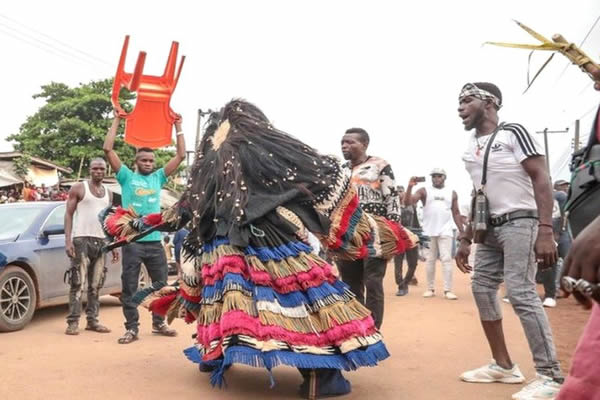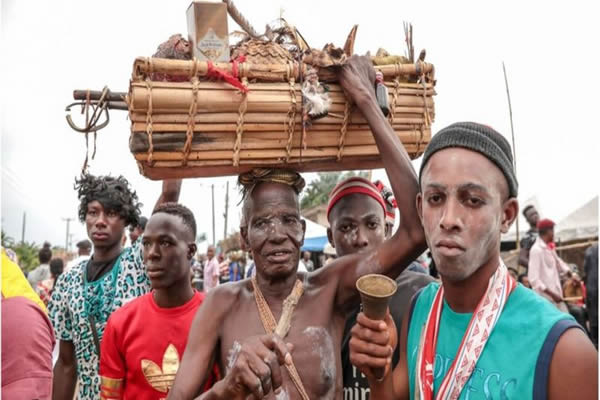
The Ikeji Festival
The Ikeji Festival The Ikeji is an annual festival of thanksgiving, merriment and propitiation, which comes up either in the month of March or April every year. The Ikeji festival is very rich, in both historical and cultural festivities, filled with scintillating performances from masquerades, memorable sights, comic acts and magical dances from different dance groups. The festival began as a ceremony to mark the end of the planting season and the beginning of the harvest season.The Ikeji festival is a four-market days’ (out-izu uka) festival, which is equivalent to one week in the English calendar. Each of these market days: Eke, Orie, Afor and Nkwo, has its own significance and represents a particular aspect of the Ikeji festival.
The first day is Eke. At each Eke market, farmers and individuals bring the best of their farm produce and livestock to the market and are sold at reduced prices. Orie is the second day, which is set aside for feasting and slaughtering of livestock in advance preparation for subsequent days. On the third day, which is Afor, there is more merriment and display of small masquerades and small dance groups’ performances.Nkwo is the day for the grand finale. This day marks the end of the festival and, as such, it is the most colourful of all the days. On this day, Nnekwu Nmanwu (big masquerade) appears, dressed extravagantly in their most appreciated regalia and costumes, dancing in their unique dance steps.

Nkwo-Achi is everyone’s destination as it is the central venue of the festivities. This colourful day showcases dance groups from different places. Each masquerade moves the great panache, attracting people’s attention in different ways. Whips made from the young malleable branches of palm tree, known as, ‘mgbajara or akpata,’ that are twisted nicely, are used to flog members of the group, to test their strength in withstanding opponents and intruders. They are also used to scare opponents as they use the whip to display fetish-looking acts. Some of the masquerades and their followers are seen carrying water in baskets, which defies the rules of science.
The juju contest, which is one side attraction at the event, is a particular spot at the central venue, where the act of ‘ito-ebule’ takes place. Here, a big ram is usually tied to a tree with a tiny rope, which ordinarily, the ram could break loose from but cannot achieve that due to some magical (voodoo) power.
Among the participants or invited guests, someone is summoned to go and untie the ram. This can only be done or achieved by a man with the strongest or most powerful protection from any powerful ‘dibia’ (native doctor). He is expected to walk confidently to the ram and loosen it. As he does this, he is confronted by spiritual attacks from other participants, aimed at knocking him down, preventing him from achieving his aim, or even killing him. At the end of the day, whoever unties the ram wins the juju contest for the year. The winner takes the ram home for feasting.
The children are not left out of the festival as they make small masks and sacks and wear on their bodies and faces to attract visitors and get small money (dash) from them.
The ‘Nkwa egwu’ (musical instrument), which accompanies the big masquerades is a sight to behold as the instruments bring out soulful melodies as well as beautiful rhythms of sounds. The ‘Ekwe’ (wooden gongs), ‘ogene’ (large metal gongs), ‘oja’ (wooden flutes), ‘igbirigba’ (bells), and ‘okom’ (drum), and so on, put together sonorous enchanting traditional sounds that encourage the masquerades and dancers to bring out the best in them.
Emergency Numbers (08034773600, 08037037283, 08033104650)
Banks in Imo
Brief History of Imo
Business and Economy
Festivals and Carnivals
General and Teaching Hospitals
Hotels and Guest Houses
Local Governments & LCDAs
Imo State Ministries Agencies and Parastatals
Police Stations
Popular Markets
Prominent Towns
Restaurants, Bars, Night Clubs
Shopping Malls
Imo State Executive Council
Tourist Attractions
Traditional Rulers




